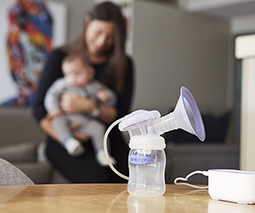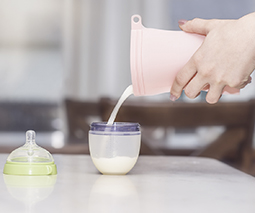Does my breastfed baby need a formula top-up?

Lots of mums worry about whether they’re making enough milk for their breastfed babies, and whether they need to top-up with formula. In the early days of breastfeeding, lots of changes are going on with your breasts as your supply comes in and your baby learns to get the milk he needs, which can be confusing.
While your breasts can feel full and firm in the first few weeks of feeding, it’s normal for them to soften once your supply has levelled out, which has many mums wondering if their milk supply has dropped. Similarly, cluster feeding behaviour – completely normal for young babies – can leave some mums concerned that her body isn’t making the milk her baby needs.
To make things even more puzzling, it’s very difficult to know exactly how much milk your baby is getting at each feed. Using a breast pump will never extract as much milk as your baby, so this is not a good indicator. And if your baby fusses between feeds, it can be an easy assumption to conclude that your baby is not getting the milk he needs from you.

However, using formula to top up feeds may not be the solution you think it is. In fact, it can actually cause the very problems you’re trying to deal with.
Here’s what you need to know about your milk supply, and whether a formula top-up will help you:
Your breastmilk relies on demand and supply
Every time you put your baby to the breast, your body receives demand signals to make milk. If your baby is at the breast often, and for a good amount of time at each feed, your body will learn to supply the exact amount of milk that your baby needs. If you introduce formula, you risk interfering with this demand and supply system, because your baby may not take the same amount of milk from you if he is taking formula. This means your body won’t end up making the amount of breastmilk your baby needs, which means you can end up with the very low milk supply issues you feared in the first place as a result.
Keeping your supply healthy
To make sure your breastmilk supply is healthy and abundant, there are a few things you can do ensure your body is getting those demand signals. Feeding your baby often (including overnight) will make sure your supply is being stimulated regularly. Those cluster feeding sessions might be a bit of a pain, but they’re a brilliant way to give your supply a boost. You can also make sure your baby drains your breast by letting him come off when he’s ready, rather than pulling him off too soon. This will ensure that your body prepares the same amount of milk for the next feed. Finally, avoid any feeding schedules while your milk supply is being established, as this could once again get in the way of the demand signals your body needs to make milk for your baby.

Signs your baby is getting enough milk
It can be hard to know what’s going on with your supply if your breast fullness changes and your baby’s behaviour at the breast isn’t always predictable. But what you can rely on are some sure signs that your baby is getting the milk he needs from you – once you notice these, you can sit back and relax, knowing your baby and your body know what they’re doing. For example, the Australian Breastfeeding Association suggest the following as signs that your baby is getting enough milk from you:
- Wee and poo output – your baby should be giving you 5-6 wet nappies a day and 3 or more soft, runny bowel movements
- Weight gain – Your baby is gaining weight and growing satisfactorily, according to the health professionals checking his development
- Alert and content between feeds – apart from periods of fussiness and cluster feeding, your baby is generally a happy little Vegemite
When top-ups are necessary
Of course, there are times when formula top-ups are necessary, for example, if a medical issue is affecting milk supply or if your baby needs some help with weight gain. It is a good idea to seek support from a health professional around this to ensure the top-up feeds don’t further compromise your breast milk supply; they will also be able to offer a weaning plan for the formula if this is an end-goal for you. If you’re worried about your milk supply, and you’re not sure what to do, it’s important to seek help early on, so you can figure out the best steps to take. A breastfeeding counsellor or lactation consultant can help you troubleshoot any feeding issues and come up with a plan that suits your personal circumstances.
 Need some more feeding advice? Our Parent School lactation experts can help. Click to find out more or book a one-on-one session.
Need some more feeding advice? Our Parent School lactation experts can help. Click to find out more or book a one-on-one session.









